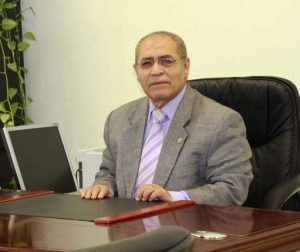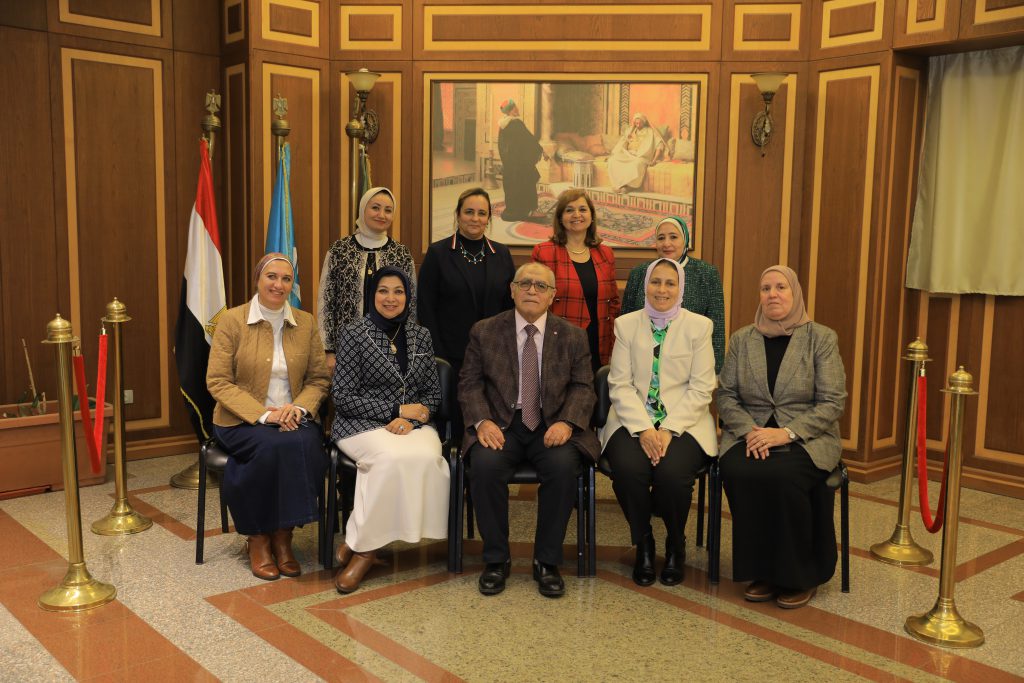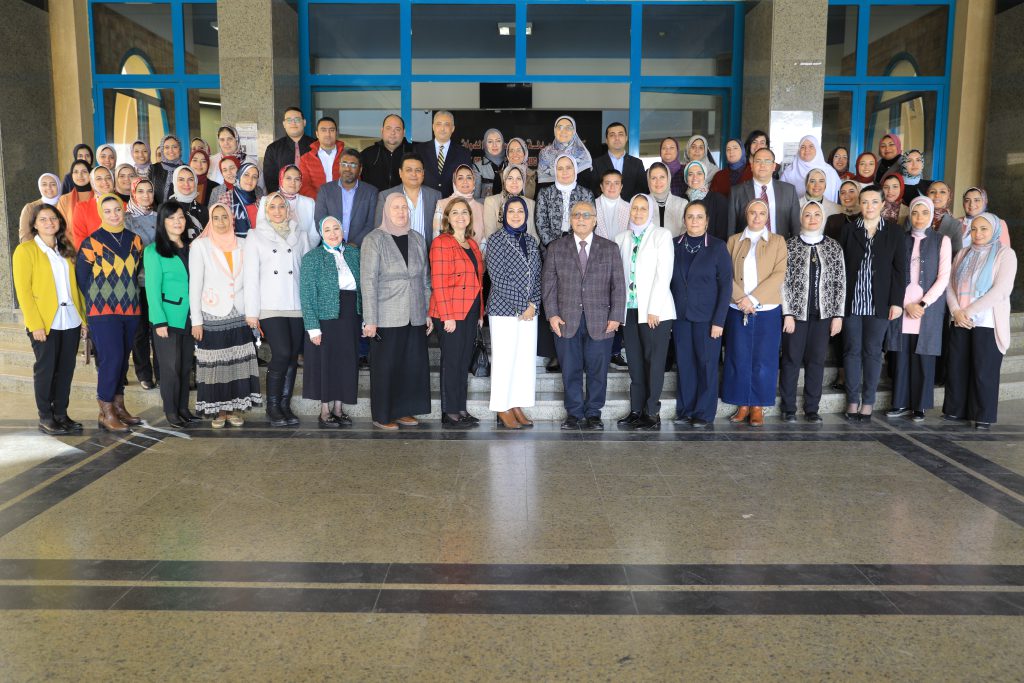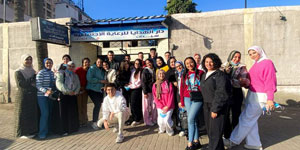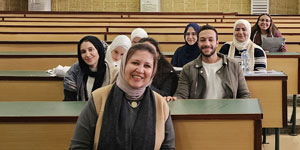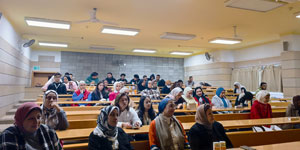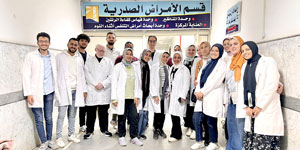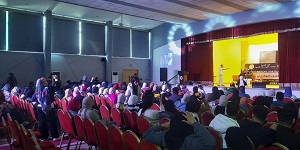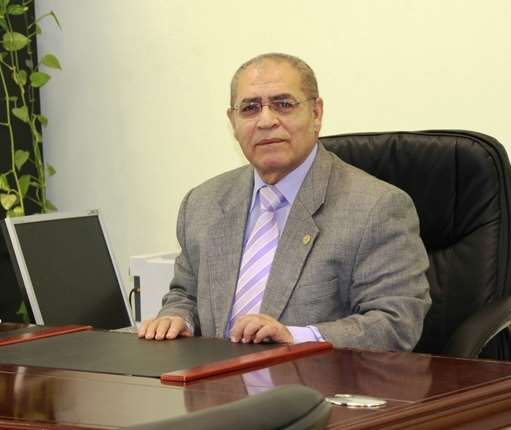Faculty of Pharmacy
My dear students…
It is my pleasure to welcome you to the page of PUA’s Faculty of Pharmacy, wishing you continued success and excellence. The Faculty of Pharmacy is among the leading accredited scientific institutions in the Arab Republic of Egypt. It was established in 2006, and its first class graduated in 2011. The Faculty obtained the NAQAAE accreditation twice; one in 2016, and another in 2021.
Over the past years, the Faculty achieved a series of achievements in education, scientific research, and institutional development. All these achievements aimed to graduate distinguished and highly trained pharmacists with competitive ability to adapt to challenges of the local and regional environments in accordance with the requirements of the modern pharmaceutical labor market. The Faculty also harnesses all its capabilities to prepare its graduates to achieve such goals.
In addition, the Faculty offers the Doctor of Pharmacy (Pharm. D) and Pharm. D Clinical programs. Studying these programs requires (6) years of study, with the penultimate year being allocated for teaching intensive clinical courses, whereas the final year is for intensive clinical training in hospital wards and health care centers.
The Faculty of Pharmacy is committed to the PUA’s vision, mission, and strategic goals to achieve Egypt’s Vision 2030. Its study plan also takes into account local and international academic accreditation standards by following the credit hour system. Further, it employs the best modern practices in pharmaceutical education, provides distinguished academic guidance, and establishes eminent research centers. The Faculty is keen to collaborate with external cooperation and exchange knowledge with various training providers to provide the best training opportunities for students.
May God grant you success in all your future endeavors.
Why study pharmacy at PUA
Since the establishment of the Faculty of Pharmacy, efforts have been directed to create a distinguished quality of education that fulfills its outcomes towards graduating a student facing the labor market in light of the rapid development and tremendous scientific boom in the pharmaceutical fields. This is what prompted the Faculty of Pharmacy to modernize and develop curricula to keep pace with the requirements of the times to be distinguished and pioneering in this field, out of our belief that Good pharmaceutical education in the age of knowledge encourages the students to be creative, innovative, use technology and continuous self-learning to develop knowledge and skills that are compatible with the requirements of the labor market and provide the graduate of the Faculty of Pharmacy with sufficient flexibility that enables him to keep pace with future changes. The result of this was that the Faculty of Pharmacy obtained renewed accreditation from the Authority. National Institute for Educational Quality Assurance and Accreditation in 2021, due to its strong elements that make it worthy of this accreditation.
Excellence in the field of clinical pharmacy and pharmacy practice:
1- The Faculty was interested in designing its study program with advanced courses to graduate a competent and skilled pharmacist using simulation programs, which is an educational method used to bring students closer to the real world, which is difficult to provide in many cases, such as programs simulating the cardiovascular system, programs simulating practical experiments on the involuntary nervous system and the respiratory system, and programs to analyze antibiotic sensitivity and resistance of microbes to antibiotics, bioinformatics applications, genetics, and other programs.
2- Providing an integrated training program aimed at providing graduates of the Faculty of Pharmacy with the opportunity to acquire knowledge and experience in a systematic manner that allows them to learn about the details of the profession in private and government hospitals, the health systems of the Ministry of Health, and research and pharmacovigilance centers. The fields of training included the intensive care unit, oncology, and pathology. Cardiology, burns, and many other clinical fields. Training also took place in government and private community pharmacies, and pharmacy education at the Faculty of Pharmacy, under the organized supervision of faculty members.
3- Students are trained in many government and private hospitals through cooperation agreements, including the Government University Hospital of Alexandria University (known as Al-Miri Hospital), and its affiliated hospitals (Al-Shatby, Smouha, Burj Al-Arab, and others), Hospital 57357 with its two branches located in Cairo and Tanta, Mustafa Kamel Armed Forces Hospital – Alexandria, Al-Salama Hospital, Zamzam Hospital, Charity Hospital for Children’s Cancer Treatment in Alexandria, Mary Morcos Hospital, Medical Research Institute, “NAPHS” and the International Heart Center “ICC”. Through the training, students are introduced to the different departments of each hospital, and real medical cases are presented and discussed with the students. It is also worth noting that the academic level of students in various hospitals has been praised.
4- Expanding the establishment of computer laboratories in the Faculty of Pharmacy, where the capacity of the Faculty’s computer laboratories was increased to 4 laboratories with 150 computers connected to the Internet, through which global databases can be accessed so that the students can use them for scientific research, carrying out academic tasks, and training in the use of information technology. In serving patients and applying the basics of clinical pharmacy.
Excellence in the field of international relations activities at the Faculty of Pharmacy:
The Faculty adopts a policy of openness to the world to learn about everything new in the field of pharmaceutical education and to find ways to cooperate with international universities through grants, conferences, and workshops. Grants funded by the European Union have been obtained to participate in conducting scientific research at the University of Eastern Finland in Finland and in coordination with the University of UPJV. In France to give virtual lectures to many professors from the Faculty of Pharmacy, as well as virtual lectures with the University of Malaya in Malaysia, and hosting professors from Aston University in England and the USPN University in France to give lectures at the third international conference at the Faculty of Pharmacy in March 2022. Visits were also made to the University of Eastern Finland within the framework of grants provided by the Federation. During this, the European Union was introduced to what is new in the field of pharmaceutical education and ways of cooperation were discussed at the undergraduate and postgraduate levels. The Faculty of Pharmacy, within the framework of ongoing cooperation between PUA and the Francophone Agency for Universities, also hosted a professor of educational sciences and educational development at the University of Geneva (TECFA) in Switzerland to conduct workshops for faculty members.
Excellence in the field of education using information technology:
The Faculty of Pharmacy seeks to keep pace with the digital transformation and provide everything new to its students to enrich the educational process in all various activities to create an advanced climate so that the graduates of the Faculty of Pharmacy – PUA are distinguished as always.
- 4 computer laboratories have been established with the latest computers and modern study and educational programs so that the student can use them in scientific research, carrying out tasks, and training in the use of technology in serving patients and applying the basics of pharmacology in the various departments of the Faculty in the various academic stages in addition to postgraduate studies.
- Activating simulation programs, which is an interesting educational method to bring students closer to the real world, increases the student’s imagination, which will increase the student’s efficiency and make him fully prepared to engage in the labor market. Simulation programs include all Faculty courses and convert many practical experiences to be virtual using computers.
- The availability of an advanced educational platform, “the Blackboard platform,” with its enormous potential for implementing many methods of digital transformation, such as electronic exams – displaying videos, discussions, assignments, and following up on pharmaceutical training. This platform also allows continuous interaction between faculty members and students. A special QR Code was also created for the Complaints Committee to easily identify student complaints.
Excellence in the field of post-graduate studies and research at the faculty:
The Faculty of Pharmacy – PUA is distinguished by being one of the first private Faculty to implement postgraduate programs because of its importance in maintaining the Faculty’s position that it obtained in renewing the quality of education and well-deserved accreditation in 2021, as well as its distinction in international publishing and the university’s appearance in international classifications, and in fulfillment of the vision and The mission of the Faculty is to become an educational and research institution with regional leadership and international distinction in the fields of pharmaceutical education, pharmaceutical manufacturing, and scientific research to serve society and develop the environment by providing distinguished programs in pharmaceutical education for the undergraduate and graduate levels and conducting scientific and applied research to achieve sustainable development in Field of pharmacy.
- The Faculty of Pharmacy at PUA awards master’s degrees in the fields of pharmaceutical chemistry, pharmacology and toxicology, pharmaceuticals, and pharmaceutical technology. The Faculty is interested in continuing the process of establishing master’s degree programs in the rest of the pharmaceutical sciences specializations and programs for granting doctoral degrees in the departments that grant master’s degrees. Students have graduated from them, namely a doctorate in pharmaceutical chemistry and a doctorate in pharmacology and toxicology.
- Several master’s theses were discussed in the Department of Pharmaceuticals and Therapeutics and the Department of Pharmaceutical Chemistry, and an elite group of faculty members teach at the Faculty of Pharmacy, PUA – and the Faculty of Pharmacy, Alexandria University.
- The availability of research activity within the framework of a research plan that is renewed every 5 years. Faculty members publish distinguished scientific studies in specialized fields in scientific fields that have a high impact factor, which is what distinguishes the Faculty of Pharmacy, which led to the emergence of the Faculty of Pharmacy at PUA in various international scientific classifications.
- Holding periodic conferences in the field of pharmaceutical sciences that address everything new and advanced in the field of pharmaceutical sciences, attended by specialists in various fields from inside and outside Egypt – and workshops are also held on the sidelines of the conference.
- Holding seminars and scientific meetings for the faculty’s scientific departments throughout the year, presenting research and modern scientific topics in the specialty, to enrich the educational process and exchange experiences.
- International publishing consultations for research are also provided to stimulate the international publishing process and raise the level of research within the faculties of PUA by assisting and guiding researchers on the methods and skills of publishing research internationally, which achieves the development of the level of scientific research to serve the patient and society within the framework of achieving sustainable development in the field of scientific research and assistance in Forming multidisciplinary research groups between the university’s various Faculties to raise the level of scientific publishing and promote researchers.
Excellence in the field of pharmaceutical and nanotechnology research:
In line with the university’s goals of linking the university with society by identifying its problems and working to propose solutions, as well as benefiting from human resources that have scientific experience in many fields and specializations at the Faculty of Pharmacy – PUA, especially in the field of pharmaceutical industries and their applications, the Pharmaceutical Research Complex and the Nanotechnology Research Laboratory The pharmacy provides services to researchers in all university faculties and other universities in the Arab Republic of Egypt and performs analyzes for companies. The complex also contains modern standard scientific equipment and contributes to providing the appropriate climate for faculty members and the supporting body to conduct scientific research for master’s and doctoral degrees, with the specialized laboratories it contains: the drug research laboratory. And toxins – natural plant research laboratory – pharmaceutical chemistry laboratory – pharmaceutical laboratory – microbiology and immunology laboratory – advanced scientific equipment laboratory, in addition to the pharmaceutical nanotechnology laboratory.
Excellence in the field of student activities, community service, and environmental development:
The Faculty of Pharmacy is interested in providing various student activities in community service and environmental development through which it meets the community’s needs for students and graduates, thus enhancing the role of students by integrating them into the surrounding community through scientific, recreational, cultural, social, and sporting activities. Training programs are also provided for graduate students to qualify them to compete in the labor market. There is a wide variety, including graduation ceremonies, welcoming new students, honoring outstanding students and winners of competitions, student sports day, recreational trips, student talent displays, student handicraft exhibitions, celebrating Orphan Day, holding a charity market, career forum, and others.
The Faculty is also concerned with the cognitive and cultural aspects of students and encourages them to compete in various knowledge fields through seminars and scientific competitions, organizing some meetings and visits to parties of society to learn about the Faculty’s activities and the available material and human capabilities, receiving many school visits to the Faculty, making field and scientific visits to hospitals and pharmaceutical factories, and visits to homes. Orphans, people of determination, caring for the elderly, meeting their needs, training students at the Center for Entrepreneurship and Professional Development, and conducting field projects and workshops.
Excellence in the field of communication with graduates:
The Faculty of Pharmacy, PUA in Alexandria, is keen to constantly cooperate with its students, especially graduates, communicate with them, find out what projects they have accomplished or achieve ambitions on the ground, and work to support, attract, and evaluate them so that they are more aspirational and distinguished among their generation of graduates of other universities and among the community in which They deal with it. From this standpoint, the Quality Assurance Unit at the Faculty of Pharmacy, in cooperation with the Faculty’s Alumni Committee, created a database for graduates, communicated with them through electronic links, and invited them to actively participate in many of the Faculty’s scientific and student activities.
In the fields of teaching and learning in the various Faculty departments:
The Faculty offers multiple options of academic programs, which represent two programs at the undergraduate level (Pharm D and Pharm D Clinical) in addition to three postgraduate programs, which are Master’s programs in Pharmaceutical Chemistry, Pharmacology and Toxicology, and Pharmaceuticals and Pharmaceutical Technology. These programs come with what meets The needs of the Egyptian and regional society.
Department of Pharmaceutical Chemistry
- The scientific content of the courses is periodically updated in line with global developments, and parts of the courses related to the sustainable development goals are included, especially the sixth goal, Clean Water and Sanitation, which addresses the issue of water pollutants and methods of analyzing them.
- The efficiency of laboratories is also being raised and advanced scientific equipment is being purchased to train students in automated analysis in drug control laboratories on pharmaceutical preparations.
- A scientific day is held for the department periodically to present research and scientific topics in the specialization to enrich the research process and exchange experiences.
- Students are assigned to do graduation projects and community field projects related to the courses taught by the students to instill the value of community work in the students and make them aware of the value of science in community service and the awareness role assigned to them.
- It is worth noting that many master’s theses in pharmaceutical chemistry were discussed for students registered in the department and awarded academic degrees from PUA – and many lecturers were promoted to the rank of assistant professor by the permanent scientific committee for promoting faculty members.
Department of Clinical Pharmacy and Pharmacy Practice
- The Department of Clinical Pharmacy and Pharmaceutical Practice carries out several training activities during the university academic year, such as training in hospitals and various research centers, including, but not limited to: Alexandria University Hospital, the Armed Forces Military Hospital, the Medical Research Institute, the International Heart Center, Andalusia Hospital, and Zamzam Hospital. , Mary Morcos Hospital, Alexandria Children’s Oncology Center and NAPHS. Areas of training include ICU, oncology, cardiology, burns and many other clinical areas. Students also participate in training in community pharmacies under organized supervision by faculty members and supporting staff, who also evaluate the students in several ways to confirm the effectiveness of the training.
- The use of computer laboratories in the Faculty has been expanded to ensure maximum benefit and enrichment of the educational process by training students on the statistics programs JASP & Jamovi. The Department of Clinical Pharmacy, in cooperation with the Department of Pharmaceutics, also coordinated organized field visits to the University Hospital in Alexandria for fourth-year students during the semester, aiming to provide students with skills and information directly and to develop critical and innovative thinking in them.
Department of Pharmaceutics and Pharmaceutical Technology:
- It trains students in pharmacy management programs, statistical data analysis programs, and the explanation of administrative tasks such as tracking inventory, expiration dates, and financial accounts. It also provides the student with pharmaceutical information that the student uses while trying to provide health care to the patient.
- The department has an educational pharmacy that is used to train students in the Faculty. It is designed with a special section for providing medical advice and a laboratory for pharmaceutical formulations. It is provided with various medications that students use in their discussions and role-playing of medical cases.
- The department organizes workshops to provide students with more scientific skills before training and working in private pharmacies, such as measuring blood pressure – dissolving and preparing medications in sound scientific ways, including sterile preparations, calculating the required drug dose, withdrawing the required volume from the syringe, as well as data entry and buying and selling operations via Available computer programs and how to use them in the pharmacy
- The department also has an educational pharmaceutical factory for bachelor’s degree students, equipped with devices and equipment for manufacturing pharmaceuticals at the laboratory level. Students are trained in the various methods of preparing pharmaceutical preparations, including tablets, capsules, suppositories, and so on. There is also a pharmaceutical control laboratory to monitor the quality of pharmaceutical preparations in which students are trained to use devices. Various measurements and analyses.
- The department specializes in teaching students the design and formulation of pharmaceutical preparations and drug delivery systems, their laboratory and biological properties, and control methods and tests to ensure quality. The department also teaches courses on the foundations and theoretical backgrounds of most industrial processes and equipment used in various pharmaceutical industries in a factory. The medicine is on the ground floor of the Faculty.
- Some experts in the field of pharmaceutical manufacturing are also hosted to conduct workshops and give lectures to students in courses that specialize in the details of pharmaceutical manufacturing in pharmaceutical factories and companies.
Department of Pharmacognosy and Medicinal Plants
The department seeks to develop the scientific content of the courses taught to students in line with the needs of the labor market, through continuous, continuous updating of the academic curricula and the introduction of new concepts – the introduction of new updated topics into the academic curricula – the use of various simulation systems and modern technological applications – holding online lectures from foreigners lecturers – Laboratories are permanently provided with modern equipment and microscopes that allow students to get a good understanding of medicinal plants and test their purity.
Department of Microbiology and Immunology
The department is keen to use modern methods and electronic simulation systems to enhance students’ knowledge of various practical experiments in the field of immunological techniques. The department also aims to transfer advanced experiences to students in the field of genetic research by supporting practical classes with electronic programs with modern applications in the field of genetic techniques.
Among the department’s achievements is cooperation with the UPJV University in France, and delivering virtual lectures for the Parasitology and Virology courses taught in the department.
Department of Pharmacology and Therapeutics
- The department is interested in conducting field research projects and linking them to community service by selecting topics that are important to members of the community, where students are made aware of the impact of these topics on human health, especially those with chronic diseases, and how to avoid harmful effects.
- The department trains students in computer laboratories to use simulation programs, which allows students to fully benefit from the practical lessons. Some new advanced programs have also been purchased, such as Experimental Pharmacology (Ex Pharm) and Sim Pharm, which are used in the department’s various courses.
- The department uses teaching methods that rely on different methods of teaching and learning, such as lectures, laboratories, exercises, research, applying the flipped classroom, learning through simulation, self-learning, and peer learning. The department’s scientific material is distinguished by its conformity with the latest international rules in the pharmaceutical and medical fields.
- The teaching and research activity of faculty members extends to some of the Faculty’s departments and the University’s Faculty of Dentistry, where the department teaches at the Faculty of Dentistry at both the undergraduate and postgraduate levels.
- The department’s faculty members constantly participate in research in the Faculty’s various departments in various fields and precise specializations, as the department includes distinguished scientific cadres. The department also pays attention to community service by contributing to the activities provided by the Faculty of Pharmacy to serve the community and participating in various scientific seminars and conferences locally and internationally.
- The department also plays an active role in the field of graduate studies and scientific dissertations and links the results of this research to clinical applications, as well as the distinguished scientific papers and patents extracted from these dissertations.
- Members of the supporting staff returning from foreign missions also benefited by teaching some modern courses in their field of specialization and transferring new knowledge and experiences gained from their foreign missions.
- The department is proud that a number of its members have obtained doctoral degrees and assistant professor degrees.
- The department has an animal house that contains various types of experimental animals that students and researchers use to conduct various pharmacological experiments.
Career Opportunities:
- Local and international health ministries and institutions
- Pharmaceutical companies
- Public Pharmacies & Hospitals Pharmacies
- Pharmaceutical development & manufacturing
- Scientific research and academic centers
- Drug quality control
- Forensic analysis of toxins
- Analysis of food and water
- Clinical laboratory testing
- Health care and patients advisory services
Q: What is the minimum grade for admission at the faculty of Pharmacy and Drug Manufacturing?
A: The minimum grade for admission is set in accordance with the resolutions passed by the Supreme Council of Egyptian Universities. The minimum grade for admission was )90%( for the last academic year 2018-2019.
Q: When is the final result of admission announced?
A: After the admission phases are ended, the admission final result is announced on the official website of Pharos University and the university Facebook page, however, the student is not considered officially registered until the tuition fees are paid and the university is given a seal of approval from the Ministry of Higher Education to the student final acceptance.
Q: Is there a high priority for early applicants?
A: There is no high priority for early applicants as long as applications are submitted during the fixed enrolment period. Admission is competitive in which applicants with top scores and complete documents are considered in the first place.
Q: What is the duration of study at the faculty of Pharmacy and Drug Manufacturing? And how many courses do students take in each semester?
A: The Old System
In accordance with the Credit Hour System, the duration of study is 5 years; two semesters in each academic year (spring and fall semesters). There is also the summer semester which is allocated for improving achieved scores or finishing uncompleted courses.
Each semester has 6-8 courses which are chosen according to the study programme of each semester.
- The New System
Starting from the academic year 2019-2020, a new system is going to be applied. The duration of study in this system is six years (five academic years+ one year of internship), thereby the degree title is changed into “Pharm D” and “Pharm D (Clinical Pharmacy)”. The first year is allocated for studying basic sciences and specialization is made from the second year.
Q: What is the education system recently applied at the faculty of Pharmacy and Drug Manufacturing?
A: It is a new system of education, according to which the five- year academic degree (B Pharm) is substituted for “Pharm D” and “Pharm D (Clinical Pharmacy)” degrees. The duration of study of these academic degrees is six years (five academic years+ one year of internship), in addition to 100 hours of field training the student should take during summer holidays (after the third year) in public and private sector pharmacies as well as other pharmacy-related places. These degrees qualify the graduates for practicing the profession of pharmacy after passing the profession test.
Q: What is the internship year?
A: It is the sixth year in the “Pharm D” and “Pharm D (Clinical Pharmacy)” programmes which provides the interns with periodical training in pharmacy-related places. This year of internship has a definite timetable, with different areas of training. This year of internship undergoes supervision, following-up, evaluation and documentation on the part of academic staff members.
Q: How does the student register for the courses in every semester?
A: The student registers for the courses of the first semester through the PUA administration. From the beginning of the second semester, the faculty assigns an academic advisor for every group of students to carry out the registration process instead. This takes place at the beginning of every semester after the academic advisor meets with each student to learn about their academic status.
Q: Is the student specialized in a certain major during his/her academic study?
A: No, the student takes courses from different areas of specialization such as:
- Pharmaceutical Chemistry
- Pharmacognosy and Natural Products
- Pharmacology and Therapeutics
- Microbiology and Immunology
- Clinical Pharmacy and Pharmacy Practice
- Pharmaceutics and Pharmaceutical Technology
The student chooses between “Pharm D” and “Pharm D (Clinical Pharmacy)” programmes after the first year. The duration of study of these programmes is six years (five academic years+ one year of internship).
Q: What is the main medium of instruction in the university?
A: English is the main medium of instruction in Pharos University, except in the case of the curricula of both the courses of Arabic Language and Pharmacy Legislations which are taught in Arabic language.
Q: What are the work fields and training opportunities available for “Pharm D” and “Pharm D (clinical pharmacy)” programmes?
A:
- Pharmaceutical companies and factories.
- Medical equipment manufacturers.
- Cosmetics manufacturers.
- Dietary supplements companies and factories.
- Medicinal plants companies and factories.
- Pharmaceutical products distributors and stores.
- Public and private sector hospitals.
- Centres and units providing health services.
- Institutions affiliated to forensic medicine.
- Ministry of Health.
- Drug control and regulatory authorities.
- Medical research, bioavailability and clinical studies institutes.
- Public and private sector pharmacies.
- Media and pharmaceutical marketing organizations.
- Working as a faculty member/teaching assistant for holders of MSc or PhD.
Q: Are the graduates of the faculty of Pharmacy and Drug Manufacturing- Pharos University allowed to obtain the card of the Pharmacists’ Syndicate and the profession practicing licence?
A: Yes, the graduates of the faculty of Pharmacy and Drug Manufacturing are allowed to obtain all the required documents from the Pharmacists’ Syndicate to practice the pharmacy profession, taking into consideration that all the graduates of the faculties of Pharmacy all over Egypt have to undergo a unified test for obtaining the profession practicing licence. This resolution is going to be applied from the academic year 2019-2020.
Q: Are the graduates of the faculty of Pharmacy and Drug Manufacturing- Pharos University allowed to apply for postgraduate studies?
- Yes, they are allowed to apply for postgraduate studies at all the faculties of Pharmacy all over Egypt, with the stipulation that they meet all the required conditions.
The faculty of Pharmacy and Drug Manufacturing at Pharos University is also pleased to announce admission open for a master’s degree in Pharmaceutical Sciences.
Q: Is there an after graduation assignment for the graduates of the faculty of Pharmacy and Drug Manufacturing at Pharos University?
A: Yes, there is an after graduation assignment for the graduates of the faculty of Pharmacy and Drug Manufacturing at Pharos University, the same as the graduates of the faculties of Pharmacy at public universities.

